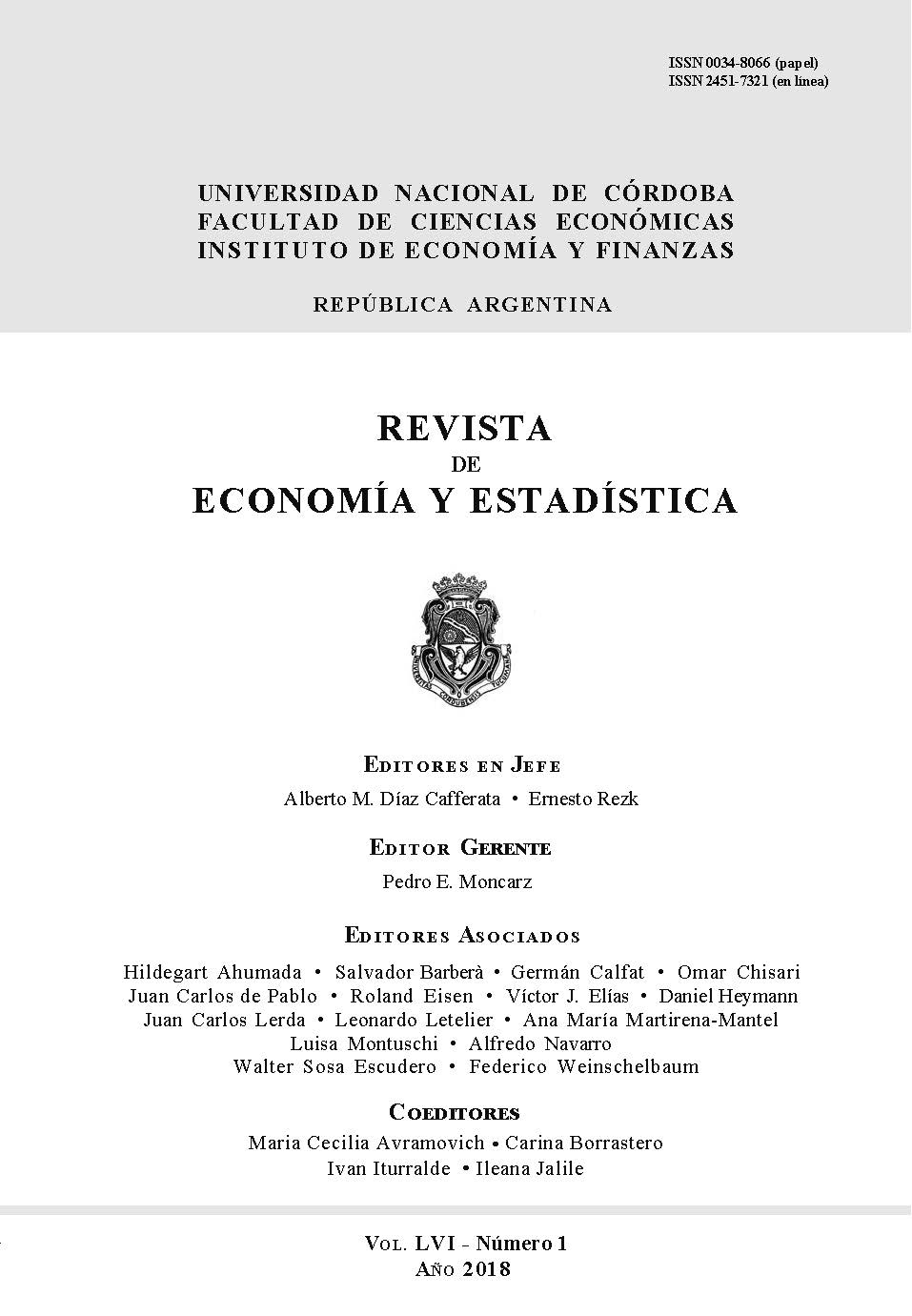Determinants of party and mayor reelection in local governments: An empirical examination for Argentina during 1983-2011
DOI:
https://doi.org/10.55444/2451.7321.2018.v56.n1.29388Keywords:
reelection, transfers, fiscal policy, local governmentsAbstract
This paper examines the determinants of reelection of parties and mayors in Argentine local elections during the 1983-2011 period. Using a unique and comprehensive database recording local elecion results for over 1200 local governments, we test three potential sources of variation: structural factors, polítical/institutional variables and economic variables. We find that incumbency advantage is strongly and significantly related with a higher probability of reelection. We also find some evidence supporting the economic voting hypothesis, that local economic conditions are relevant for explaining re-election of local governments. We also find that local governments where parties and mayors have been in office for a long time have greater re-election chances. Finally, we find that governments with municipal charters have lower probability of reelection. Summing up, there seems to be both economic and politico-institucional factors behind re-election rates of parties and mayors in Argentine local governments.
Downloads
References
Akhmedov, A., & Zhuravskaya E. (2004). Opportunistic Political Cycles: Test in a Young Democracy Setting.The Quarterly Journal of Economics 119 (4): 1301–38.
Alesina, A. (1987). Macroeconomic Policy in a Two-Party System as a Repeated Game. The Quarterly Journal of Economics 102 (3): 651–78.
Alesina, A. & Paradisi M. (2017). Political Budget Cycles: Evidence from Italian Cities. Economics and Politics 29 (2): 157–77.
Alesina, A., & Roubini N. (1992). Political Cycles in Oecd Economies. The Review of Economic Studies 59 (4): 663–88.
Ames, B. (1987). Political Survival. Berkeley and Los Angeles. University of California Press.
Arvate, P. (2013). Electoral Competition and Local Government Responsiveness in Brazil. World Development 43: 67–83.
Arvate P., Avelino G., Tavares J., & others. (2009). Budget Deficits and Reelection Prospects: Voters as Fiscal Conservatives in a New Democracy. Economic Letters 102 (2): 125–27.
Barberia, L. & George Avelino. (2011). Do Political Budget Cycles Differ in Latin American Democracies? Economía 11 (2): 101–34.
Bee C., & Moulton S. (2015).“Political Budget Cycles in Us Municipalities. Economics of Governance 16 (4): 379–403.
Besley, T., & Case A. (1995a). Does Electoral Accountability Affect Economic Policy Choices? Evidence from Gubernatorial Term Limits. The Quarterly Journal of Economics 110 (3): 769–98.
Besley, T., & Case A. (1995b). Incumbent Behavior: Vote-Seeking, Tax-Setting, and Yardstick Competition. The American Economic Review 85 (1): 25.
Bordalejo Mediavilla, M. (2005). Determinantes Políticos de Las Transferencias Discrecionales: Evidencia de La Provincia de Córdoba, Argentina. Revista de Economía Y Estadística 43 (1): 167–92.
Boulding C., & Brown D. (2014). Political Competition and Local Social Spending: Evidence from Brazil. Studies in Comparative International Development 49 (2): 197–216.
Bracco E., Lockwood B., Porcelli F., & Redoano M. (2015). Intergovernmental Grants as Signals and the Alignment Effect: Theory and Evidence. Journal of Public Economics 123: 78–91.
Brender, A. (2003). The Effect of Fiscal Performance on Local Government Election Results in Israel: 1989–1998. Journal of Public Economics 87 (9-10): 2187–2205.
Brender A. & Drazen A. (2005). Political Budget Cycles in New Versus Established Democracies.” Journal of Monetary Economics 52 (7): 1271–95.
Brender A. & Drazen A. (2008).How Do Budget Deficits and Economic Growth Affect Reelection Prospects? Evidence from a Large Panel of Countries. American Economic Review 98 (5): 2203–20.
Brollo F., & Nannicini T. (2012). Tying Your Enemy’s Hands in Close Races: The Politics of Federal Transfers in Brazil. American Political Science Review 106 (04): 742–61.
Cao, H.(1999). Elecciones Y Reelecciones En El Nivel Municipal Argentino: 1983-1999. Buenos Aires, Grupo Provincias/Jefatura de Gabinete de Ministros.
Cingolani, M., Mazzalay V., & Nazareno M. (2009). Gobiernos Locales, Redes Y Distribución Del Gasto Provincial En Argentina. El Caso de Córdoba. Prepared for the 2009 Congress of the Latin American Studies Association.
Fenwick, T. (2010). The Institutional Feasibility of National-Local Policy Collaboration: Insights from Brazil and Argentina. Journal of Politics in Latin America 2 (2): 155–83.
Ferraz C., & Finan F. (2011). Electoral Accountability and Corruption: Evidence from the Audits of Local Governments. American Economic Review 101 (4): 1274–1311.
Freille S. & Capello M. (2014a). Electoral Effects of Intergovernmental Fiscal Transfers: An Application to Local Elections in the Province of Cordoba, 1995-2011. Revista de Economía y Estadística 52 (1): 113–35.
Freille S. & Capello M. (2014b) “Electoral Effects of Intergovernmental Fiscal Transfers: An Application to Local Elections in the Province of Cordoba, 1995-2011. Revista de Economía Y Estadística 52 (1): 113–35.
Gibson E., & Calvo E. (2000). Federalism and Low-Maintenance Constituencies: Territorial Dimensions of Economic Reform in Argentina. Studies in Comparative International Development 35 (3): 32–55.
González L. (2012). The Power of Governors. Conceptualization, Measurement, and Comparative Analysis. Documentos de Trabajo de La Escuela de Política Y Gobierno, no. 1: 1–29.
Guo, G. (2009). China’s Local Political Budget Cycles. American Journal of Political Science 53 (3): 621–32.
Hibbs D. (1977). Political Parties and Macroeconomic Policy. American Political Science Review 71 (4): 1467–87.
Kraemer, M.(1997). Electoral Budget Cycles in Latin America and the Caribbean: Incidence, Causes, and Political Futility.
Levitt, S. (1995). The Impact of Federal Spending on House Election Outcomes. National Bureau of Economic Research Cambridge, Mass., USA.
Martins R. & Veiga F. (2013). Economic Voting in Portuguese Municipal Elections. Public Choice 155 (3-4): 317–34.
Nieto Parra S., & Santiso J. (2009). Revisiting Political Budget Cycles in Latin America.
Nordhaus, W. (1975). The Political Business Cycle. The Review of Economic Studies 42 (2): 169–90.
Paldam, M. (1981). A Preliminary Survey of the Theories and Findings on Vote and Popularity Functions. European Journal of Political Research 9 (2): 181–99.
Paniagua, M. (2012).“El Partido Justicialista y La Asignación Estratégica de Recursos: Un Estudio Comparado del Nivel Subnacional en Argentina. Revista SAAP 6 (1): 0–0.
Persson T. & Tabellini G. (2005). The Economic Effects of Constitutions.MIT press.
Porto A. & Porto N. (1999). Desempeño Fiscal Y Resultados Electorales. Mimeo, La Plata, Universidad Nacional de La Plata-Departamento de Economía.
Porto A. & Porto N. (1999). “Influencia de Las Condiciones Económicas Y Fiscales Sobre Los Resultados Electorales Provinciales Y Municipales.” Documento de Trabajo Del Departamento de Economía Nro 26.
Rodríguez-Chamussy, L. (2015). Local Electoral Rewards from Centralized Social Programs: Are Mayors Getting the Credit? Inter-American Development Bank.
Rogoff, K. (1990). Equilibrium Political Budget Cycles. The American Economic Review, 21–36.
Rogoff K. & Sibert A. (1988). Elections and Macroeconomic Policy Cycles.The Review of Economic Studies 55 (1): 1–16.
Rumi, C. (2014). National Electoral Cycles in Transfers to Subnational Jurisdictions. Evidence from Argentina. Journal of Applied Economics 17 (1): 161–78.
Sakurai S. & Menezes-Filho N. (2011).Opportunistic and Partisan Election Cycles in Brazil: New Evidence at the Municipal Level. Public Choice 148 (1-2): 233–47.
Sakurai S. & Menezes-Filho N. (2008). Fiscal Policy and Reelection in Brazilian Municipalities. Public Choice 137 (1-2): 301–14.
Shi, M. & Svensson J. (2002a). Conditional Political Budget Cycles.
Shi, M. & Svensson J. (2002b). Political Budget Cycles in Developed and Developing Countries. Institute for International Economic Studies, Stockholm University, 18.
Sour, L. (2013). The Flypaper Effect in Mexican Local Governments. Estudios Económicos, 165–86.
Suárez Cao J. (2011). ¿Federal en teoría pero unitaria en la práctica?: Una discusión sobre el federalismo y la provincialización de la política en Argentina. Revista SAAP 5 (2): 0–0.
Timmons J. & Broid D. (2013). The Political Economy of Municipal Transfers: Evidence from Mexico. Publius: The Journal of Federalism, pjt007.
Titiunik, R. (2009). Incumbency Advantage in Brazil: Evidence from Municipal Mayor Elections. University of California-Berkeley, Mimeo.
Veiga L., & Veiga F. (2007). Political Business Cycles at the Municipal Level. Public Choice 131 (1-2): 45–64.
Downloads
Published
Issue
Section
License
Copyright (c) 2018 Sebastián Freille, Víctor Mazzalay

This work is licensed under a Creative Commons Attribution-NonCommercial-NoDerivatives 4.0 International License.
Authors who have publications with this journal agree to the following terms:
Authors retain their copyright and grant the journal the right of first publication of their work, which is simultaneously subject to the Creative Commons Attribution-NonCommercial-NoDerivatives 4.0 International License that allows third parties to share the work provided that its author and first publication in this journal are indicated.
Authors may adopt other non-exclusive licensing arrangements for distribution of the published version of the work (e.g. depositing it in an institutional telematic archive or publishing it in a monographic volume) as long as the initial publication in this journal is indicated.
Authors are allowed and encouraged to disseminate their work via the Internet (e.g. in institutional telematic archives or on their website) before and during the submission process, which can lead to interesting exchanges and increase citations of the published work. (See The Open Access Effect)










